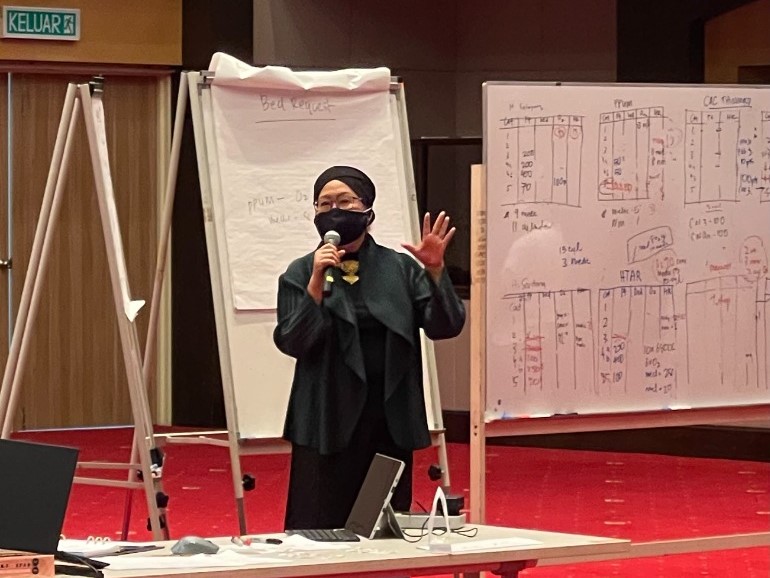KUALA LUMPUR, August 23 — The Covid-19 epicentre has begun shifting to outside the Klang Valley, potentially with disastrous consequences in states with far less health care resources than the commercial region.
Now, coronavirus infections are surging in Johor, Kelantan, Kedah, Perak, and Sabah with poor vaccine coverage — all of which have only double-vaccinated less than a third of their total populations — pushing up the nation’s overall daily cases to a record high of more than 23,000 last Friday.
Over the past several weeks, the Klang Valley — with the biggest concentration of public and private medical facilities — struggled with a surge of infections that overwhelmed hospitals to the point of health workers comparing the crisis to the peak of India’s epidemic.
Then, the government launched the Operation Surge Capacity accelerated vaccine rollout in the middle of last month and the Greater Klang Valley Special Task Force (GKVSTF) on July 8.
Daily Covid-19 cases in the Klang Valley recently showed promising signs of abating, declining from a peak of more than 12,000 cases on August 6 to about 6,800 cases on August 18. However, daily coronavirus cases in the region climbed to 8,272 cases on August 21, prompting health officials to be cautiously optimistic. Infections in the commercial region used to contribute up to 70 per cent of daily total cases, but now only make up about 37 per cent.
As of yesterday, the Klang Valley has the third-highest proportion of fully vaccinated adults at 83.8 per cent, behind Labuan and Sarawak, where severe Covid-19 cases have also dropped.
While Klang Valley’s accelerated vaccination rate proved crucial in bringing down hospital admissions, intensive care unit (ICU) occupancy, and infections in recent weeks, mitigation strategies under GKVSTF helped to reinforce the health care system.
Dr Jemilah Mahmood, former special advisor to former Prime Minister Muhyiddin Yassin on public health, has developed a participatory GKVSTF Playbook as a living document to catalogue lessons learned and share good practices across the country to enable solutions.
Dr Jemilah worked alongside the GKVSTF commander, together with the Health and Sciences Covid-19 Advisory Group of Experts (EAG) that was established on February 8. The playbook was written from her capacity, involvement and observations as part of the GKVSTF.
Although she led efforts to produce the playbook, “when the idea was suggested, everyone was willing to collaborate to bring it to life”.
Speaking to CodeBlue recently, Dr Jemilah hoped that the playbook would offer much-needed insights to policymakers and operational teams at the state or district levels on ways to organise a systematic pandemic response by learning from GKVSTF’s implementation successes and — more importantly — failures.
Getting Everyone On Board
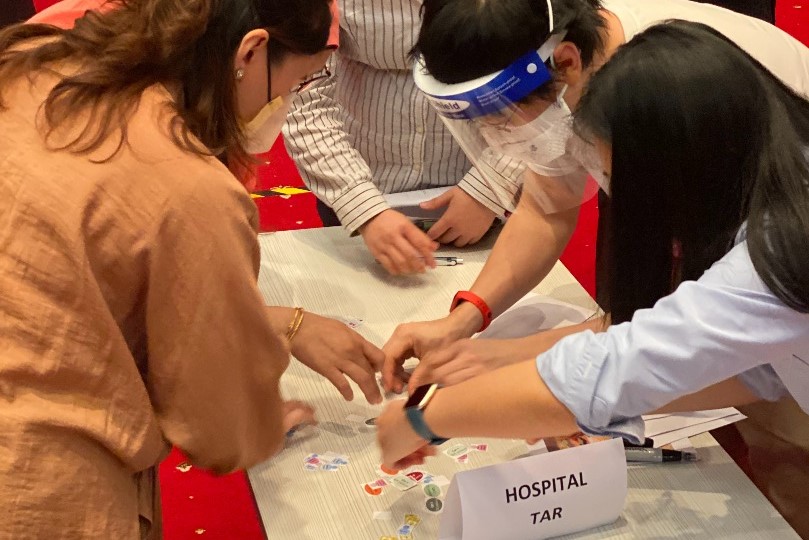
Given her broad 20-year experience in crisis management in humanitarian work, Dr Jemilah knows how important it is to have collaborative working teams from an extensive range of networks to push response efforts faster and further to those in need.
“We needed people who could just take off and do only this (managing the pandemic in Klang Valley). The deputy director-general of public health was to lead this, but very early on, we also said we needed the defence forces on board because the military is primed to manage crises — they have a lot of personnel, they can move fast, they’re very strategic, and they can execute with precision, and this is what we needed,” Dr Jemilah said.
“But on top of that, we also needed to establish a structure where the private sector, the university hospitals, the civil society, and the individual experts can come in and bring their experience and expertise to the taskforce under the leadership of the commander, Dr Chong Chee Kheong.”
Dr Chong is Health deputy director-general charged with leading the GKVSTF and below him are two joint commanders from the Malaysian Defence Forces and Ministry of Health (MOH). These stakeholders will then be sorted into different “clusters” so that the work can be divided equally.
“We quickly set up something called the compliance monitoring team so that we could actually set KPIs for each of these groups, and we would then, almost every night in the first few weeks, meet every evening to check back what was going on, where the shortfalls were, how do we support each other, and how do we bring new people in.”
Dr Jemilah Mahmood, former special advisor on public health to former Prime Minister Muhyiddin Yassin
This collaborative approach allowed various aspects of crisis management to be spread out and not be left to the MOH to solve alone. She said the most critical lesson from the GKVSTF is that the more collaborative and open leaders are in welcoming new ideas, the more problems can be addressed and solved.
“Saying that I’m collaborating with the private sector and everyone else is not the same as bringing them into your governance structure, to be working directly with you in finding solutions.
“When you’re willing to listen to others, new solutions come in, new ideas come through, and also new ways of looking at problems emerge. And I think that’s exactly what happened with the taskforce,” Dr Jemilah said.
Live Dashboards, Table Top Exercises, And Makeshift Ambulances
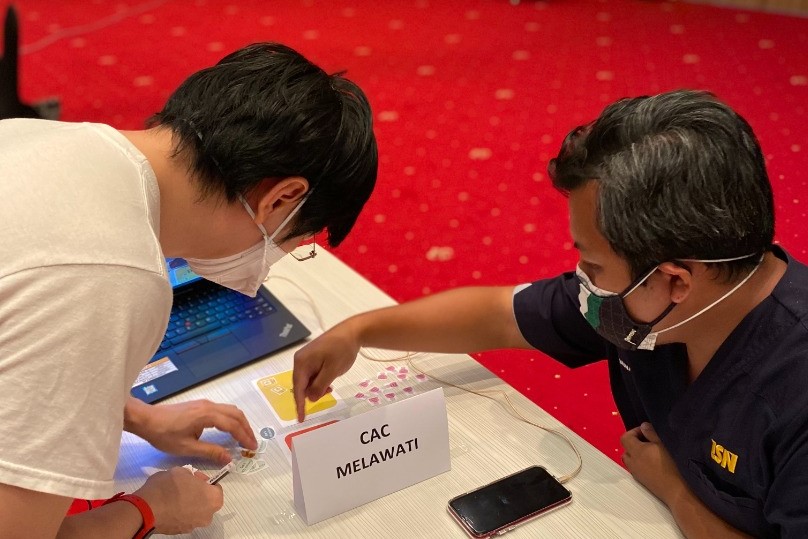
The Klang Valley Covid-19 situation was a multidimensional crisis — high daily caseloads, lack of beds for Covid-19 patients, oxygenation problems, and logistics issues, to name a few.
One of the primary examples that GKVSTF did was setting up a virtual Covid-19 Assessment Centre (CAC) that prevented large crowds from forming at physical CACs and made patient assessments more convenient.
In an August 13 media briefing, Dr Chong said about 80,000 positive Covid-19 cases in the Klang Valley under home quarantine were being monitored by the virtual CAC. Roughly half of these cases were asymptomatic in Category One, 30 per cent with mild symptoms in Category Two, while 20 per cent showed warning signs.
An essential element of the virtual CAC is the call centre through which patient monitoring is done. For this, the GKVSTF roped in the services and expertise of telco providers Telekom Malaysia Bhd and Time Dotcom Bhd.
The GKVSTF also mobilised students, volunteers, and civil servants working from home via the Public Service Department to manage contact tracing, which allowed valuable human resources to be repurposed to support health centres.
“When we weren’t doing this, these nurses and doctors were filling out Excel forms and making phone calls when they have better use of handling patients.”
Dr Jemilah Mahmood, former special advisor on public health to former Prime Minister Muhyiddin Yassin
Meanwhile, to deal with the high patient caseloads in Klang Valley hospitals, the GKVSTF took the task of actively decanting non-Covid patients to private hospitals.
“This was done even before the taskforce, but through the GKVSTF, the decanting process was quite aggressive, and I must say, I have to put on record that the private hospitals were very, very supportive; they really wanted to help. They not only took in the non-Covid patients, but they also increased the number of Covid patients they will be taking care of,” Dr Jemilah said.
The MOH previously estimated that about 15,000 non-Covid patients at public hospitals would be transferred to private hospitals by year-end.
MOH secretary-general Mohd Shafiq Abdullah said 40 government hospitals and 76 private hospitals are currently involved in the outsourcing exercise nationwide to increase bed capacity in MOH hospitals for coronavirus cases in Categories Three, Four and Five.
With different types of hospitals — full Covid, university, military, district, and private hospitals — being part of a vast network of beds for Covid and non-Covid patients, there was a need to create a real-time live dashboard that would allow GKVSTF to quickly identify admission and discharge patterns to know if beds are sufficient and if they are readily available for patients.
“We created what we call the bed management unit so that we could start moving patients around to make room. The thing we did was to make sure that Categories Three, Four, and Five patients have beds, whether it’s a bed in an emergency department, a bed in a hospital, or a bed at Malaysia Agro Exposition Park Serdang (MAEPS) or a military or MERCY Malaysia field hospital.
“The beds at MAEPS were ramped up to 2,800 beds, and then we even planned for 7,000 in the event of a worst-case scenario,” Dr Jemilah explained.
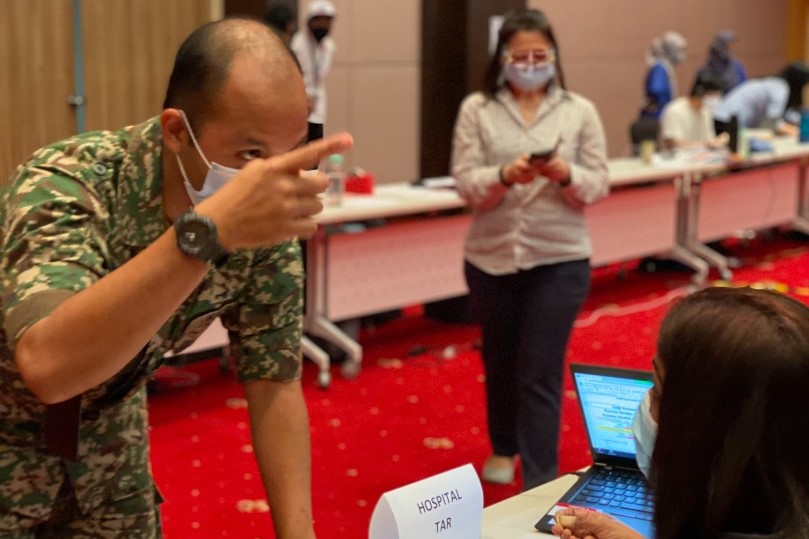
To help frontline health workers better respond to a surge in Covid-19 cases, the GKVSTF carried out war games, where selected health workers spend an entire day at a training centre to experience different scenarios on what they needed to do in a given situation.
“This way, everybody knew what they needed to do if they had to ramp up or ramp down, so it was very actively continually anticipating what next and what would be the doomsday scenario.”
On logistical issues, Dr Jemilah said the taskforce got creative in expanding the mode of transport for Covid-19 patients to include buses and passenger vans.
“There is only a finite number of ambulances. We have government ambulances, ambulances by civil society organisations, Red Crescent ambulances in St John’s, and private ambulances.”
“But some patients don’t need to be transported by ambulances. So, for example, those who have a very mild disease but are high-risk can be brought to MAEPS on the bus, so we repurposed these large buses.”
Dr Jemilah Mahmood, former special advisor on public health to former Prime Minister Muhyiddin Yassin
“We also received a generous contribution from Sime Darby Foundation to use 20 Hyundai Starex so they can also transport patients. And then for some of the buses, it will even be possible to fit oxygen on them. So, it was about making sure that your logistics can support your operations,” Dr Jemilah said.
“It’s really about getting everyone on the same page and working as one team. For every cluster, we had a civilian counterpart and a military counterpart. The military counterpart will always help with whatever logistic bottlenecks you had, and MOH had dedicated personnel to look at medical logistics and human capital, things like that,” she said.
Beyond The Klang Valley
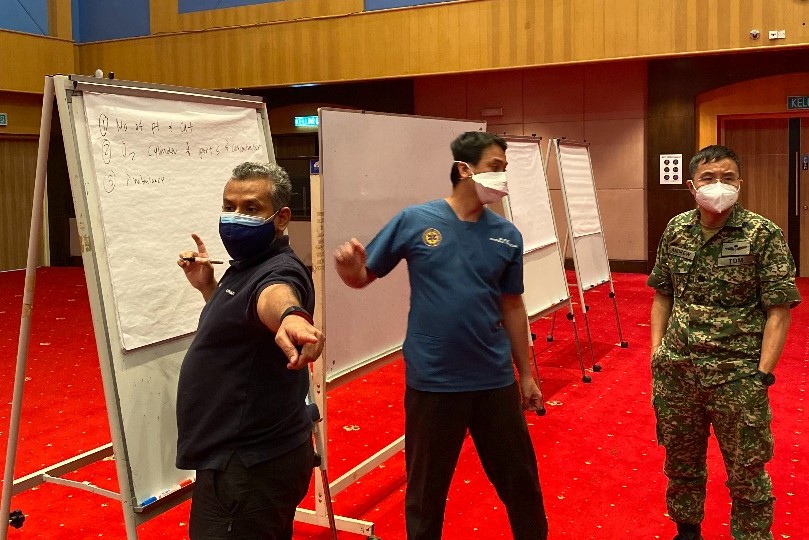
Dr Jemilah was recently in Sabah to support the ramp-up of vaccinations and meet state health authorities to share, adapt and implement some of the points in the GKVSTF playbook, while infectious disease specialist Prof Dr Adeeba Kamarulzaman was in Johor to do the same for the southern state.
“I’m very pleased to say that in Sabah, they have agreed to set up a taskforce and appoint a commander (to lead) because at the same time, they have to quickly ramp up their vaccinations amidst more complicated logistics challenges, while managing a surge in Covid-19 cases.
“We are very fortunate because the new state health director (Dr Rose Nani Mudin) came from Putrajaya and she’s very well versed with the vaccination programme, as she was part of the pioneering team that started the vaccination centres (PPVs).”
“So, they’re willing to embrace the lessons from the playbook, they will be looking at the bed management unit, looking at how to expand availability of oxygen, and how to make sure that their human resource is better distributed. The state government has even agreed to allow their civil service to support the Sabah taskforce.”
Dr Jemilah Mahmood, former special advisor on public health to former Prime Minister Muhyiddin Yassin
“So it’s good to see that even with the 10 lessons we have given, they can have a promising start. What’s also good is the people in Klang Valley too have given their contacts so that people from the Sabah or Johor team can refer to — because this is about sharing lessons, right, sharing experiences,” Dr Jemilah said.
On whether she expects all states in Malaysia to adopt the same strategies from the GKVSTF playbook, Dr Jemilah said no one size fits all in managing a crisis.
“Each state must adapt, but some states may not even need to use it. Because if they’re already managing it well, then there’s no reason to change. If it’s not broken, we don’t fix it.
“So, I think where Covid-19 cases are on the rise, the playbook will give people ideas on what they might be able to do to manage the surge,” Dr Jemilah said.
“One of the biggest and nicest observations in GKVSTF is that everybody was clear on the purpose of the taskforce. Conclusion: there were no ego issues, everybody was collaborative, and everyone wanted to see results because we made every group set their KPIs and had to meet them and record that. So, it was all about driving performance for results.”


